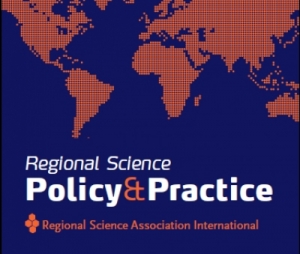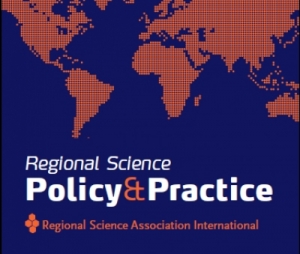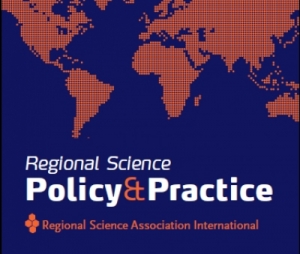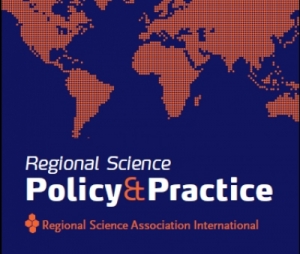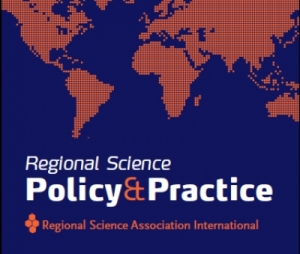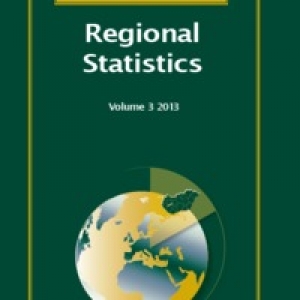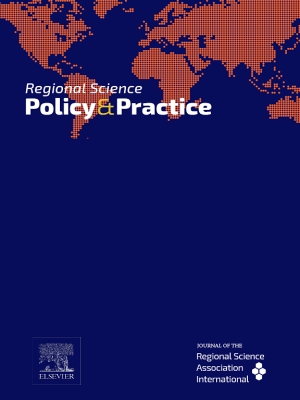RSPP Special Issue Award
Elisabete Martins
Call for Papers | RSPP Special Issue on Sustainable Development of Afghanistan and Iran

Regional Science Policy & Practice (RSPP)
Call for Papers Special Issue: Sustainable Development of Afghanistan and Iran
Editor
Abdul Shaban - School of Development Studies, Tata Institute of Social Sciences, Mumbai, India, This email address is being protected from spambots. You need JavaScript enabled to view it.
Given, the difficult political history and development situation, Afghanistan and Iran requires deeper analysis of its existing situation and human practices to learn and track itself on the path of sustainable development. The major challenge before the country is how to evolve a war economy into a peaceful and sustainable economy. The proposed special issue of Regional Science Policy & Practice will attempt to understand the possibilities of development of Afghanistan and Iran in the context the regional history and current reality, with the following major subareas (though not limited to),
- From war to peace, prospects for regional development in Afghanistan and Iran
- Regional philosophy of peace and development and spatial practices
- Economic structure and potentials of growth
- Inequality, poverty, and potential for sustainable community development
- The role of trade, especially the regional trade (India, Pakistan, China, Iran, and Central Asian Countries), and investment in development,
- Urban centers, regional growth (including rural-urban), and development
- Educational Institutions, skills, and human capital
- Women and development
- Sustainable Development Goals in the Regions of Afghanistan and Itan
Manuscript submission information:
All submissions must be original and may not be under review elsewhere. All manuscripts will be submitted via the Regional Science Policy & Practice online submission system (https://www.editorialmanager.com/rspp/). Authors should indicate in the cover letter that the paper is submitted for consideration for publication in this special issue “Sustainable Development of Afghanistan and Iran”, otherwise, your submission will be handled as a regular manuscript.
- Submissions open until December 31, 2024.
Call for Papers | RSPP Special Issue: Regional Development in Central Asia: situation and challenges

Regional Science Policy & Practice (RSPP)
Call for Papers Special Issue: Regional Development in Central Asia: situation and challenges
Guest editors
Makhabbat Ramazanova - University Portucalense, Portugal, This email address is being protected from spambots. You need JavaScript enabled to view it.
Andrey Shenin - Narxoz University (Almaty, Kazakhstan), This email address is being protected from spambots. You need JavaScript enabled to view it.
Farhod Ahrorov - Samarkand branch of Tashkent state university of economics, This email address is being protected from spambots. You need JavaScript enabled to view it.
Central Asia, with its strategic geographical location, rich historical past and economic growth, has consistently attracted the interest of the international academic community. In order to ensure sustainable, inclusive and resilient development of the region, it is first and foremost necessary to explore the issues, opportunities and challenges of regional development in Central Asia, necessary for effective policymaking, international cooperation and improving the well-being of people in the region. There are many emerging issues in this context, such as sustainability and stability, institutions and development, legal frameworks for sustainable development, economic geography, tourism for regional development, regional policy analysis, political economy, spatial economics and planning, environmental and ecological analysis, and transport networks among others. Recognising the need for high-quality research within a specific timeframe required to sustain the progress of human society, this special issue aims to provide a platform consistent with the overarching topic of the journal, fostering discussion and presenting cutting-edge research on the various challenges and opportunities of regional development in Central Asia.
Keywords
Central Asia, regional development, sustainability, economic growth.
Manuscript submission information:
All submissions must be original and may not be under review elsewhere. All manuscripts will be submitted via the Regional Science Policy & Practice online submission system (https://www.editorialmanager.com/rspp/). Authors should indicate in the cover letter that the paper is submitted for consideration for publication in this special issue “Regional Development in Central Asia: situation and challenges”, otherwise, your submission will be handled as a regular manuscript.
- Submissions open until December 31, 2024.
Note:
As an open access journal with no subscription charges, a fee (Article Publishing Charge, APC) is payable by the author or research funder to cover the costs associated with publication. This ensures your article will be immediately and permanently free to access by everyone. The Article Publishing Charge for this journal is EUR 1596, excluding taxes.
The RSPP editorial team are pleased to cover APCs for a selected number of accepted articles that are unable to secure sufficient funding. Authors can indicate whether they wish to be considered for this waiver at the beginning of the submission process or by emailing This email address is being protected from spambots. You need JavaScript enabled to view it.
All submitted papers should address significant issues pertinent to the theme of this issue and fall within the scope of Regional Science Policy & Practice (RSPP). Criteria for acceptance include originality, contribution and scientific merit. All manuscripts must be written in English with high scientific writing standards. Acceptance for publication will be based on referees’ and editors’ recommendations, following a detailed peer review process.
Why publish in this Special Issue?
- Special Issue articles are published together on ScienceDirect, making it incredibly easy for other researchers to discover your work.
- Special content articles are downloaded on ScienceDirect twice as often within the first 24 months than articles published in regular issues.
- Special content articles attract 20% more citations in the first 24 months than articles published in regular issues.
- All articles in this special issue will be reviewed by no fewer than two independent experts to ensure the quality, originality and novelty of the work published.
RSPP Call for Papers | Special Issue: Progress and new challenges of sustainable tourism development

Regional Science Policy & Practice (RSPP)
Call for Papers Special Issue: Progress and new challenges of sustainable tourism development
Guest editors
Pilar Tejada - University of Seville, Seville (Spain); This email address is being protected from spambots. You need JavaScript enabled to view it.
Reyes González-Relaño - University of Seville, Seville (Spain); This email address is being protected from spambots. You need JavaScript enabled to view it.
This special issue provides an opportunity to explore the sustainable tourism from a multidisciplinary approach (economics, geography, psychology, sociology). Sustainability continues to be one of the main challenges facing tourism industry today, especially considering that a gap between theoretical principles sustainability and its practical applications.
- Sustainable tourism development models.
- Typologies and experiences of sustainable tourism.
- Instruments and relationships in sustainable tourism development.
- Sustainability and climate change.
- Innovation for tourism sustainability
- Territorial aspects of tourism from a sustainability perspective.
- Overtourism
Keywords
Tourism, sustainable, models, applications, climate change, innovation, green transition.
Manuscript submission information:
All submissions must be original and may not be under review elsewhere. All manuscripts will be submitted via the Regional Science Policy & Practice online submission system (https://www.editorialmanager.com/rspp/). Authors should indicate in the cover letter that the paper is submitted for consideration for publication in this special issue “Progress and new challenges of sustainable tourism development”, otherwise, your submission will be handled as a regular manuscript.
- Submissions open until January 31, 2025.
Note:
As an open access journal with no subscription charges, a fee (Article Publishing Charge, APC) is payable by the author or research funder to cover the costs associated with publication. This ensures your article will be immediately and permanently free to access by everyone. The Article Publishing Charge for this journal is EUR 1596, excluding taxes.
The RSPP editorial team are pleased to cover APCs for a selected number of accepted articles that are unable to secure sufficient funding. Authors can indicate whether they wish to be considered for this waiver at the beginning of the submission process or by emailing This email address is being protected from spambots. You need JavaScript enabled to view it.
All submitted papers should address significant issues pertinent to the theme of this issue and fall within the scope of Regional Science Policy & Practice (RSPP). Criteria for acceptance include originality, contribution and scientific merit. All manuscripts must be written in English with high scientific writing standards. Acceptance for publication will be based on referees’ and editors’ recommendations, following a detailed peer review process.
Why publish in this Special Issue?
- Special Issue articles are published together on ScienceDirect, making it incredibly easy for other researchers to discover your work.
- Special content articles are downloaded on ScienceDirect twice as often within the first 24 months than articles published in regular issues.
- Special content articles attract 20% more citations in the first 24 months than articles published in regular issues.
- All articles in this special issue will be reviewed by no fewer than two independent experts to ensure the quality, originality and novelty of the work published.
Call for Papers | Special Issue on Left Behind Areas. Past, Present and Future

Regional Science Policy & Practice (RSPP)
Call for Papers Special Issue: Left Behind Areas. Past, Present and Future
Editor
Ana Viñuela - Universidad de Oviedo, Dpto Economia Aplicada, Oviedo, SPAIN; This email address is being protected from spambots. You need JavaScript enabled to view it.
Territorial inequalities are barely studied at a local level in Europe in a comprehensive way mainly due to the lack of comparative data or proxies of economic activity. Without local data it is impossible to proof the agglomeration of economic activity (in the cities) and therefore the growing gap between rural and urban areas, between the centre and the periphery of the country or between the core and the fringe of the large metropolitan areas. This is one of the reason why, when studying the areas that have been left-behind, any research tends to focus on case studies.
In this Special Issue we will try to combine both qualitative and quantitative research on areas (as opposed to regions) that indeed have been left-behind the paths of economic growth of prosperity. The aim would be trying to answer some of the following questions: What is the meaning of the left-behindness concept? How can we identify the left-behind areas? Where are those areas? What are their characteristics? What quantitative data are available to study left-behindness? Are there any common past characteristics that might explain their present situation? What can be done at the different levels of governance (European, national and local) to improve their situation? What has been done in different areas of Europe? And what about regional or local stakeholders? Are citizens mobilizing somehow to either protest or react in order to reverse their localities´ situation?
Keywords
Territorial inequalities at local level, Localities vs regions, economic growth, Left-behind concept, accessibility, depopulation, local- based policies, local discontent, local initiatives.
Manuscript submission information:
All submissions must be original and may not be under review elsewhere. All manuscripts will be submitted via the Regional Science Policy & Practice online submission system (https://www.editorialmanager.com/rspp/). Authors should indicate in the cover letter that the paper is submitted for consideration for publication in this special issue “Left Behind Areas. Past, Present and Future”, otherwise, your submission will be handled as a regular manuscript.
- Submissions open until December 31, 2024.
- Compile a Special Issue with at least seven accepted papers: April 2025.
Note:
As an open access journal with no subscription charges, a fee (Article Publishing Charge, APC) is payable by the author or research funder to cover the costs associated with publication. This ensures your article will be immediately and permanently free to access by everyone. The Article Publishing Charge for this journal is EUR 1596, excluding taxes.
The RSPP editorial team are pleased to cover APCs for a selected number of accepted articles that are unable to secure sufficient funding. Authors can indicate whether they wish to be considered for this waiver at the beginning of the submission process or by emailing This email address is being protected from spambots. You need JavaScript enabled to view it.
All submitted papers should address significant issues pertinent to the theme of this issue and fall within the scope of Regional Science Policy & Practice (RSPP). Criteria for acceptance include originality, contribution and scientific merit. All manuscripts must be written in English with high scientific writing standards. Acceptance for publication will be based on referees’ and editors’ recommendations, following a detailed peer review process.
Keywords:
public finance, tax policy, public spending, tax competition, fiscal disparity, fiscal equity, fiscal health, fiscal sustainability, infrastructure funding, green bonds
Why publish in this Special Issue?
- Special Issue articles are published together on ScienceDirect, making it incredibly easy for other researchers to discover your work.
- Special content articles are downloaded on ScienceDirect twice as often within the first 24 months than articles published in regular issues.
- Special content articles attract 20% more citations in the first 24 months than articles published in regular issues.
- All articles in this special issue will be reviewed by no fewer than two independent experts to ensure the quality, originality and novelty of the work published.
RSPP Call for Papers | Special Issue on Sustainable Regional Development in Sub-Saharan Africa

Regional Science Policy & Practice (RSPP)
Call for Papers Special Issue: Sustainable Regional Development in Sub-Saharan Africa
Editor
Samuel Odei Amponsah - Hradec Kralove, Czechia; This email address is being protected from spambots. You need JavaScript enabled to view it.
Sub-Sahara Africa has experienced different challenges in recent periods that interest many areas of Regional Science: such as spatial and social disparities, exploitation of natural resources, urbanization, and migration, just to mention some.
Therefore, this special issue will feature research (with sound methods and replicable evidence) that sheds light on the different challenges that Sub-Sahara Africa will face in the next decades, with a special focus on regional policies which can lead to solving these issues.
The objective of this issue is to provide a better understanding of human interaction within space in Sub-Sahara Africa to address the problems of people and places.
Keywords
Sustainable development, spatial and social disparities migration, urbanization, regional development, Sub-Sahara Africa.
Manuscript submission information:
All submissions must be original and may not be under review elsewhere. All manuscripts will be submitted via the Regional Science Policy & Practice online submission system (https://www.editorialmanager.com/rspp/). Authors should indicate in the cover letter that the paper is submitted for consideration for publication in this special issue “Sustainable Regional Development in Sub-Saharan Africa”, otherwise, your submission will be handled as a regular manuscript.
- Submissions open until July 15, 2025.
Note:
As an open access journal with no subscription charges, a fee (Article Publishing Charge, APC) is payable by the author or research funder to cover the costs associated with publication. This ensures your article will be immediately and permanently free to access by everyone. The Article Publishing Charge for this journal is EUR 1596, excluding taxes.
The RSPP editorial team are pleased to cover APCs for a selected number of accepted articles that are unable to secure sufficient funding. Authors can indicate whether they wish to be considered for this waiver at the beginning of the submission process or by emailing This email address is being protected from spambots. You need JavaScript enabled to view it.
All submitted papers should address significant issues pertinent to the theme of this issue and fall within the scope of Regional Science Policy & Practice (RSPP). Criteria for acceptance include originality, contribution and scientific merit. All manuscripts must be written in English with high scientific writing standards. Acceptance for publication will be based on referees’ and editors’ recommendations, following a detailed peer review process.
Keywords:
public finance, tax policy, public spending, tax competition, fiscal disparity, fiscal equity, fiscal health, fiscal sustainability, infrastructure funding, green bonds
Why publish in this Special Issue?
- Special Issue articles are published together on ScienceDirect, making it incredibly easy for other researchers to discover your work.
- Special content articles are downloaded on ScienceDirect twice as often within the first 24 months than articles published in regular issues.
- Special content articles attract 20% more citations in the first 24 months than articles published in regular issues.
- All articles in this special issue will be reviewed by no fewer than two independent experts to ensure the quality, originality and novelty of the work published.
RSPP Call for Papers | Special Issue: Public Finance in Regional Development and Sustainability

Regional Science Policy & Practice (RSPP)
Call for Papers Special Issue: Public Finance in Regional Development and Sustainability
Guest editor
Soomi Lee – Department of Public Administration, University of La Verne (USA); This email address is being protected from spambots. You need JavaScript enabled to view it.
The Regional Science Policy & Practice (RSPP) is pleased to announce a special issue focused on the intersection of public finance and regional science. This issue seeks contributions that bridge academic studies and practical applications to understand the role of public finance in regional development and sustainability.
Regional science and public finance are two fields that, while addressing related issues, often operate in silos. While both fields contribute to our understanding of economic systems, their separation limits an integrated perspective of how public finance shapes regional outcomes and, conversely, how regional characteristics influence the design and impact of fiscal policies.
In this special issue, we aim to break down these silos.
We welcome papers from various disciplines, including public policy, economics, urban planning, geography, public administration, and environmental science. Submissions should employ sound and replicable methods that generate robust evidence. We encourage collaborative contributions between researchers and practitioners to provide actionable recommendations.
We will welcome the following themes, among others:
- Tax policy and spatial development
- Fiscal decentralization and inter- and intra-regional fiscal and socioeconomic disparities
- Intergovernmental transfers and regional economic resilience in Climate-impacted regions
- Financing green transitions in regions
- Fiscal policies and migration, such as workforce mobility and rural depopulation.
- Infrastructure finance and the role of public-private partnerships to finance large-scale projects
- Inter- and intra-comparative regional fiscal policies and best practices in developed and developing countries
We look forward to your contributions that will help shape the future of public finance and regional development policy.
Manuscript submission information:
All submissions must be original and may not be under review elsewhere. All manuscripts will be submitted via the Regional Science Policy & Practice online submission system (https://www.editorialmanager.com/rspp/). Authors should indicate in the cover letter that the paper is submitted for consideration for publication in this special issue “Public Finance in Regional Development and Sustainability”, otherwise, your submission will be handled as a regular manuscript.
- Submissions open until July 31, 2025.
- Compile a Special Issue with at least seven accepted papers: May 2026.
Note:
As an open access journal with no subscription charges, a fee (Article Publishing Charge, APC) is payable by the author or research funder to cover the costs associated with publication. This ensures your article will be immediately and permanently free to access by everyone. The Article Publishing Charge for this journal is EUR 1596, excluding taxes.
The RSPP editorial team are pleased to cover APCs for a selected number of accepted articles that are unable to secure sufficient funding. Authors can indicate whether they wish to be considered for this waiver at the beginning of the submission process or by emailing This email address is being protected from spambots. You need JavaScript enabled to view it.
All submitted papers should address significant issues pertinent to the theme of this issue and fall within the scope of Regional Science Policy & Practice (RSPP). Criteria for acceptance include originality, contribution and scientific merit. All manuscripts must be written in English with high scientific writing standards. Acceptance for publication will be based on referees’ and editors’ recommendations, following a detailed peer review process.
Keywords:
public finance, tax policy, public spending, tax competition, fiscal disparity, fiscal equity, fiscal health, fiscal sustainability, infrastructure funding, green bonds
Why publish in this Special Issue?
- Special Issue articles are published together on ScienceDirect, making it incredibly easy for other researchers to discover your work.
- Special content articles are downloaded on ScienceDirect twice as often within the first 24 months than articles published in regular issues.
- Special content articles attract 20% more citations in the first 24 months than articles published in regular issues.
- All articles in this special issue will be reviewed by no fewer than two independent experts to ensure the quality, originality and novelty of the work published.
The New Issue of Regional Statistics is already Available! (2024, VOL 14, No 5)
THE NEW ISSUE OF REGIONAL STATISTICS IS ALREADY AVAILABLE!
We are pleased to inform you that a new issue of the Regional Statistics has been released and now it’s available online.
https://www.ksh.hu/terstat_eng_current_issue
REGIONAL STATISTICS, 2024, VOL 14, No 5.
STUDIES
Dear Readers,
We are pleased to say that the 5/2024 issue of Regional Statistics has been published and available online!
CONTENT
Trung Ngo Minh - Zoltán Gál: Determinants of foreign direct investment in South East Asian countries: the role of infrastructure, human development, and economic freedom
http://www.ksh.hu/statszemle_archive/regstat/2024/2024_05/rs140501.pdf
Jalil Mujib Tan Ismail - Rezzy Eko Caraka - Prana Ugiana Gio - Rung Ching Chen - Bens Pardamean: Exploiting the leading potential of Indonesia through strategic alliances with the G20 and SDG-aligned policy making
http://www.ksh.hu/statszemle_archive/regstat/2024/2024_05/rs140502.pdf
Gama Putra Danu Sohibien - Setiawan Setiawan - Dedy Dwi Prastyo: Threshold spatial vector autoregressive with metric exogenous variables (TSpVARX) for regional inflation and money outflow prediction
http://www.ksh.hu/statszemle_archive/regstat/2024/2024_05/rs140503.pdf
Sven Maertens - Wolfgang Grimme: The discontinuation of domestic flights in Austria: a case study on the impact on passenger routings, regional airports and the environment
http://www.ksh.hu/statszemle_archive/regstat/2024/2024_05/rs140504.pdf
Péter Kovács - Miklós Lukovics: Statistical analysis of Hungarian cities’ autonomous vehicle preparedness: correlations, ranking and neural network http://www.ksh.hu/statszemle_archive/regstat/2024/2024_05/rs140505.pdf
Mostafa Ghaderi Hajat: Examination of the welfare indices of Iran’s border and central regions from the perspective of spatial justice
http://www.ksh.hu/statszemle_archive/regstat/2024/2024_05/rs140506.pdf
Sonu T. S. - Mohammed Firoz C. - Priyadarsanan Dharma Rajan: Assessment of regional flood vulnerability: a case of Kuttanad Wetland System, Kerala, India
http://www.ksh.hu/statszemle_archive/regstat/2024/2024_05/rs140507.pdf
Dorottya Szemere - Imre Dobos: The impact of residence location and the accessibility of alternative electric micro-mobility vehicles on electric scooter usage patterns in Hungary
http://www.ksh.hu/statszemle_archive/regstat/2024/2024_05/rs140508.pdf
Join us to our social networking sites:
New Issue: Regional Science Policy & Practice | Volume 16, Issue 11 , November 2024
|
|
|
|
|
|
|
|
|
|
|
|
|
|
|
|
|
|
|
Post-Doctoral position Faculty of Economics, Administration and Accounting University of Sao Paulo, Brazil
Post-Doctoral position
Faculty of Economics, Administration and Accounting University of Sao Paulo, Brazil
Project: Fapesp 2024/01097-2, CCD -Centros de Ciências para o Desenvolvimento
The research project: The post-doc researcher will participate in a multidisciplinary research project involving the areas of Economics, Urban Planning, and Transport Engineering on the consequences of urban sprawl on the cities of Sao Paulo State, Brazil. The project is funded by the São Paulo State Science Foundation (FAPESP – Fundação de Amparo à Pesquisa do Estado de São Paulo) and the State Secretary of Urban Development (Secretaria de Desenvolvimento Urbano do Estado de São Paulo).
Skills requirement: The specific task of this post-doc position is in the economic part of the project. The candidate must have concluded his/her Ph. D. program after 2019, be fluent in spatial econometrics, causal inference and machine learning, be familiar with large-scale databases using R, Python, Stata, and similar software, and be familiar with SQL. Using satellite imagery to identify the evolution of the spatial distribution of population and jobs is also required. The idea is to associate the rapid development of analysis techniques and ways of obtaining information via artificial intelligence with the growing availability of massive and detailed databases. The objective is to apply innovative sources of information about people's movements with recent methods of analyzing large masses of data.
Participation: The tasks will be developed at the University of Sao Paulo Urban and Regional Economics Lab – NEREUS (Núcleo de Economia Regional Urbana da Universidade de São Paulo), at the USP main campus in Sao Paulo. The candidate will have a workstation at the NEREUS Lab and must participate physically in all the Lab’s academic activities, such as seminars, conferences, etc.
Language: Interactions could be both in Portuguese or English, but all documentation and research material will be in Portuguese. Therefore, ability to reading in this language is a necessary condition.
Location: USP Campus, Cidade Universitária, Sao Paulo
Duration: 24 months
Remuneration: BRL 12.000,00 per month
The candidate must have concluded her/his Ph. D. program after 2019
The proposals must be sent to This email address is being protected from spambots. You need JavaScript enabled to view it.between October 20 and November 20, 2024. They must include a diploma or certificate of conclusion of a Ph. D. program, a detailed CV, and a statement of interest.
Details on the FAPESP Post-doctoral fellowships at https://fapesp.br/en/postdoc
Post-Doctoral position at the Faculty of Economics, Administration and Accounting, University of Sao Paulo, Brazil
Post-Doctoral position at the Faculty of Economics, Administration and Accounting, University of Sao Paulo, Brazil
Project: Fapesp 2024/01097-2, CCD -Centros de Ciências para o Desenvolvimento
The research project: The post-doc researcher will participate in a multidisciplinary research project involving the areas of Economics, Urban Planning, and Transport Engineering on the consequences of urban sprawl on the cities of Sao Paulo State, Brazil. The project is funded by the São Paulo State Science Foundation (FAPESP – Fundação de Amparo à Pesquisa do Estado de São Paulo) and the State Secretary of Urban Development (Secretaria de Desenvolvimento Urbano do Estado de São Paulo).
Skills requirements: The specific task of this post-doc position is in the economic part of the project. The candidate must have concluded his/her Ph. D. program after 2019, be familiar with input-output analysis, CGE modeling, and integrated modeling, and have previous experience with R. The objective is to contribute to the development of integrated macro-spatial simulation models to forecast sectoral employment and sectoral activity in different cities across the state of São Paulo. The research will focus on analyzing different economic scenarios, incorporating spatial and macroeconomic dynamics, and generating insights that can support regional development policies. By simulating employment trends in specific sectors, the results will be used to feed microsimulation models at a finer spatial scale We expect the candidate to demonstrate a strong ability to work effectively in teams, contributing to the collaborative development of complex macro-spatial simulation models.
Participation: The tasks will be developed at the University of Sao Paulo Urban and Regional Economics Lab – NEREUS (Núcleo de Economia Regional Urbana da Universidade de São Paulo), at the USP main campus in Sao Paulo. The candidate will have a workstation at the NEREUS Lab and must participate physically in all the Lab’s academic activities, such as seminars, conferences, etc.
Language: Interactions could be both in Portuguese or English, but all documentation and research material will be in Portuguese. Therefore, ability to reading in this language is a necessary condition.
Location: USP Campus, Cidade Universitária, Sao Paulo
Duration: 12-24 months
The candidate must have concluded her/his Ph. D. program after 2019. Applicants must send an email to This email address is being protected from spambots. You need JavaScript enabled to view it. and This email address is being protected from spambots. You need JavaScript enabled to view it. between October 15 and November 14, 2024, with the following documents:
- Curriculum summary in the FAPESP model (maximum 4 pages), according to https://fapesp.br/sumula;
- Cover letter with a brief description of your research interests and experience, and a statement of interest.
The vacancy is open to Brazilians and foreigners. The selected candidate will receive a monthly FAPESP Post-Doctoral Scholarship of R$ 12.000,00.
More details on the FAPESP Post-doctoral fellowships are at https://fapesp.br/en/postdoc
About Us
The Regional Science Association International (RSAI), founded in 1954, is an international community of scholars interested in the regional impacts of national or global processes of economic and social change.

